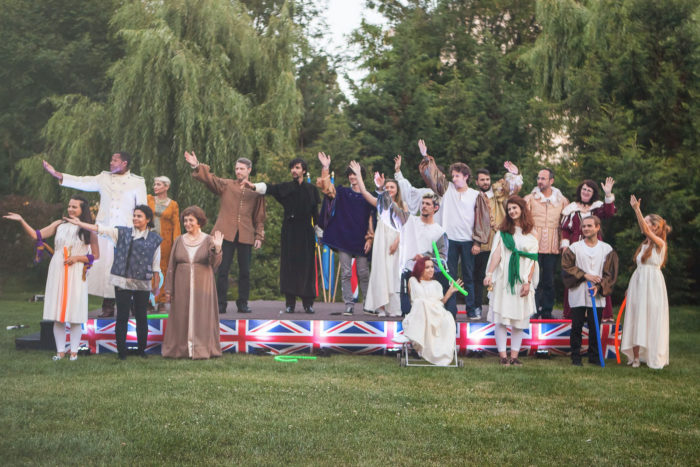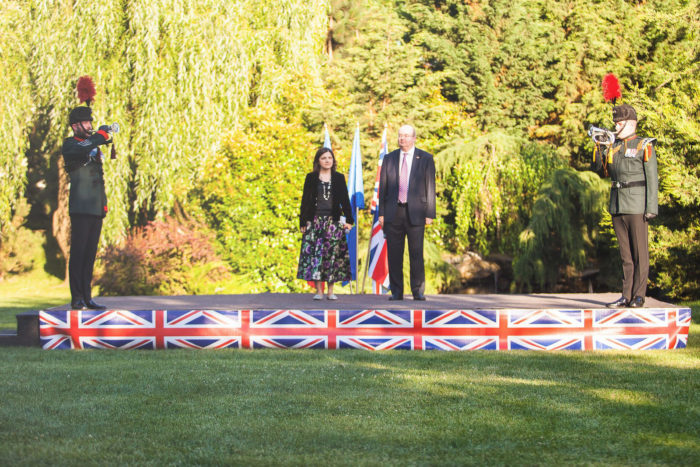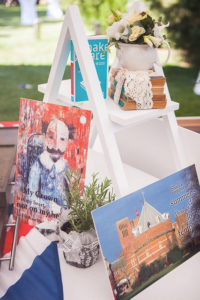21st June 2016
Celebrating the Queen’s Birthday and UK/Romania Relations in Bucharest


The British Embassy in Bucharest hosted last week a reception for our partners and contacts across the worlds of government, business, diplomacy, culture, civil society, defence and law enforcement cooperation. The reception marked the official birthday of Her Majesty the Queen, which falls on the 2nd Saturday in June. Her Majesty’s actual birthday is 21 April, and 2016 was a very special year for the United Kingdom, as Her Majesty turned 90 this year.
2016 is also a significant year for British culture. It marks the 400th anniversary of the death of William Shakespeare, the poet and playwright who is often regarded as the world’s pre-eminent dramatist. The British government is supporting a Shakespeare Lives campaign around the world to celebrate his works and their continuing relevance, and we are delighted that actor Ion Caramitru, the Director of the National Theatre of Bucharest and the celebrated Hamlet of Alexandru Tocilescu’s 1985 production, is the ambassador for the campaign in Romania.
The story of Shakespeare in Romania is one of an enduring love affair. Translations of Shakespeare into Romanian were closely associated with a westernising revolutionary spirit during the 19th century, which saw authors such as Shakespeare as beacons in an attempt to prise Romania’s political and cultural orientation away from the influences of Ottoman and Russian empires in the East, and towards the West. Romania’s greatest poet, Mihai Eminescu, was strongly influenced by Shakespeare, acknowledging the debt in his poem Cartile. In the late communist period, Shakespeare’s plays became a vehicle for the delivery of coded political messages designed to caricature and criticise the regime. And Romania today hosts the remarkable International Shakespeare Festival in Craiova, one of the fine cultural events taking place across Romania which the British government, through the British Council, has been delighted to support.

Our reception last week was enriched by a fascinating bilateral community based-theatre collaboration led by Philip Parr and the innovative Parrabola company, which worked with a team from Craiova to perform scenes from Romeo and Juliet in the midst of the event. We were also delighted to have with us the Chichester University Chamber Orchestra, conducted by Crispin Ward, who performed an imaginative Shakespeare-themed repertoire through the evening.
This has been an important year too for the bilateral relationship between Britain and Romania, crowned by the visit to Bucharest in December of Prime Minister David Cameron, the first bilateral visit to Romania of a British Prime Minister for 16 years. The visit included productive meetings with President Iohannis and Prime Minister Ciolos, and Mr Cameron laid a wreath at the site of the appalling Club Colectiv night club fire in October. Nine victims of that fire were transported to the United Kingdom for treatment in hospitals in England and Wales – a sign of the strength of friendship between our two countries even during times of adversity.
The number and level of senior official visits in both directions is a sign of both the strength and breadth of our relationship. Romanian ministerial visits to the UK last month alone included that of Deputy Prime Minister Borc and the Minister of Justice to attend the London Anti-Corruption Summit, where Romania set out an impressive range of national commitments. Defence Minister Motoc’s visit marked the latest step in a deepening profile of defence collaboration, which has included the visit to Constanta in November of HMS Duncan, Britain’s most modern destroyer, the visit to Romania in April of our Chief of Defence Staff, and a series of joint exercises bringing together British and Romanian troops. I’m delighted that representatives of the Second Battalion the Rifles, in Romania for the latest in this series of exercises, attended our reception this week. And Finance Minister’s Dragu’s visit to London marked the importance of investment cooperation between our two countries, with the minister opening the market at the London Stock Exchange on 13 May.
 The many Great Britons who have given their enthusiasm, talent and time to supporting Romanians in need constitute another important element of the partnership between friends which characterises the UK – Romania relationship. Some of the saddest events of the past year have been the passing of a number of these remarkable individuals. Peter Tweedie, an enthusiast in all matters, who did much to promote rugby links between our countries. Vikki Askew, one of many Britons who was appalled to discover the condition of Romanian youngsters institutionalised in large orphanages in the Ceausescu period and who worked tenaciously to promote their deinstitutionalisation. I will be travelling next month to the Bradet orphanage in Brasov, for a ceremony to dedicate a multi-sensory room in her honour. It has been organised by the Libra Foundation, a charity promoting volunteering among young people in order to improve the lives of the disabled and disadvantaged in Romania, with whom Vikki worked closely. And Barbara Knowles, a British environmentalist, and senior science policy advisor to the Royal Society of Biology, who fell in love with the hay meadows and pastoral woodlands of Transylvania. She confronted motor neurone disease with great bravery and championed a wide range of environmental causes in Romania from haymaking camps in Ghimes to the Remarkable Trees of Romania project. The commemoration I attended in her honour last month, at the top of the Pogany-Havas peak in Harghita County, was a truly moving experience.
The many Great Britons who have given their enthusiasm, talent and time to supporting Romanians in need constitute another important element of the partnership between friends which characterises the UK – Romania relationship. Some of the saddest events of the past year have been the passing of a number of these remarkable individuals. Peter Tweedie, an enthusiast in all matters, who did much to promote rugby links between our countries. Vikki Askew, one of many Britons who was appalled to discover the condition of Romanian youngsters institutionalised in large orphanages in the Ceausescu period and who worked tenaciously to promote their deinstitutionalisation. I will be travelling next month to the Bradet orphanage in Brasov, for a ceremony to dedicate a multi-sensory room in her honour. It has been organised by the Libra Foundation, a charity promoting volunteering among young people in order to improve the lives of the disabled and disadvantaged in Romania, with whom Vikki worked closely. And Barbara Knowles, a British environmentalist, and senior science policy advisor to the Royal Society of Biology, who fell in love with the hay meadows and pastoral woodlands of Transylvania. She confronted motor neurone disease with great bravery and championed a wide range of environmental causes in Romania from haymaking camps in Ghimes to the Remarkable Trees of Romania project. The commemoration I attended in her honour last month, at the top of the Pogany-Havas peak in Harghita County, was a truly moving experience.
Britain’s relationship with Romania rests then on a rich partnership born of friendship, as our Queen’s Birthday celebration here in Bucharest this week testified.